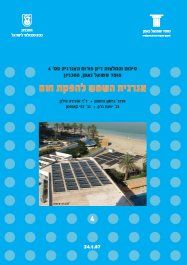Introduction
The Samuel Neaman Institute for Advanced Research in Science and Technology, within the framework of its activity in the energy field, conducts meetings of the Energy Forum, devoted to discussions and debate over energy related issues of national importace.
The Energy Forum holds focused discussions regarding specified themes, and teams of subject-matter experts are invited to participate. The aim of these focused debates is to deliberate over specific and relevant questions; enable dialogue and coordination between participating bodies; and develop recommendations on implementation strategies for advancing the subject at hand that could then be presented to decision-makers.
So far a number of meetings were conducted: Electricity from Photovoltaic Systems (February 2006); Combined Heat and Power -Cogeneration Systems (May 2006); Waste To Energy (October 2006). A complete record of the reports and presentations can be found here.
The present meeting of the Energy Forum was devoted to the subject of using solar energy for producing heat. This field holds great potential for Israel and for many other nations worldwide.
The meeting was held at the Samuel Neaman Institute at the Technion on January 24th 2007. Over twenty experts from industry, academia, governmental departments and the public sector participated. The Forum participants were selected with great care for their thematic expertise and have formed, undoubtedly, a unique group of first-rate professionals in the energy field in general, and in the use of solar heat, in particular.
During the first part of the meeting several participants presented information on worldwide and Israeli activities in the use of solar energy for the production of heat, discussing technological and economic considerations along with incentives offered by different nations to encourage the use of solar heat. A complete record of the presentations can be found here.
During the second part of the meeting the participants engaged in an open discussion regarding the issues presented and the operative conclusions that could be derived from them.
This brief synopsis provides highlights of the Summary and Conclusions chapter from the full report (in Hebrew). The goal is to present these recommendations to decision makers and create the momentum for placing the State of Israel in the forefront of nations developing and using green energy systems. Forum participants were in complete agreement about the need for public awareness campaigns, hoping that they will serve as a call for action to regulators and government legislators.
Background
According to Israel Central Bureau of Statistics (2005) the end-use of energy in Israel amounts to 12 million tons of oil equivalent (TOE) per annum. Energy usage is divided into three, nearly equal parts as follows: one-third for transportation, one-third for the production of electricity and one- third for other uses- mostly all for process heat in different temperature ranges- for domestic, commercial/institutional and industrial uses.
When examining the possibility of supplying these energy demands from renewable sources, particularly solar energy, it is evident that the transportation sector would be the hardest to supply, followed by the electricity sector that utilizes a known, but expensive to produce, technology. Heat production, especially in low range temperature for domestic, institutional and industrial use, appears to benefit most from renewable sources, mainly from solar energy.
In practice, despite the availability of sunlight in Israel, the use of solar energy to produce heat, amounts to only one tenth of its potential and is utilized mostly for heating water at private dwellings.
A government regulation, enacted under the planning and construction lawin 1980, requiring the placing of solar water heating systems in new private dwellings, greatly advanced the usage of solar energy. This regulation along with the positive, cumulative results that followed has placed Israel first in the world in the use of solar energy per capita (3% of the primary national energy consumption).
It is important to indicate that this regulation also obligates hospitals, elderly citizens’ homes, hotels, dormitories, and educational institutions to comply. However, while local planning and construction committees enforce the regulation on private dwellings, there is no enforcement mechanism directed towards commercial and public institutions. There is no reference in the law to the industrial sector, which consumes process heatfor producing hot water or steam (some in relatively low temperature).
While private consumers make abundant use of solar energy, there is hardly any use of it in the industrial sector, despite the fact that this sector is much more suitable for using solar heat. It should be noted that since the industry is mostly active during the day the need to store heat is reduced; also, industrial buildings usually have large roof areas free of shadowing thus an ideal location for installation of solar systems. Economy of Scale must also be noted. Selling one solar system to industry is equal to selling a hundred domestics systems to individual consumers. And last but not least, industry is well equipped to provide on-going maintenance to installed systems while the private consumer is not.
As can be seen, it is possible to further lower the cost of solar thermal industrial systemsfor most of the business sector Yet, there is still only marginal use of solar heat systems in industry when compared with the domestic sector.One reason for that is, without a doubt, the Israeli tax system. A private consumer, who uses a sun-heated water tank, saves his/her out of pocket electricity expense while the business consumer saves on his taxed expense. Combusting polluting fuels to produce heat is considered a deductible business expense, but investing in a solar thermal system will be amortized (and deducted) over a ten year schedule, making the return on investment not economic.
The aim of this forum meeting was to identify the regulatory, economic and information obstacles that delay the use of solar thermal hot water systems in the public and business sectors.
Summary and Conclusions
The Science and Technology committee of the Israeli Knesset met on the longest day of 2004 (21.6.2004) to discuss methods to promote solar energy in Israel. Knesset Member, Meli Polishook, the head of the committee, closed the discussion with these words:
The Science and Technology Knesset committee calls the Israeli government to invest in R&D in solar energy and implement solar power stations; invest in other technologies and enforcethe law dealing with sun-heated water tanks; and invest in Photovoltaic Systems and other such technologies. The more we invest in technology development and acquire knowledge; the more production costs will decrease and allow these technologies to compete with conventional electricity production. It doesn’t make sense that in a country that has advanced technologies, and is the source of the Torah, has first-rate professionals and technologies and shining sunlight most of the year that the government will not invest in solar energy. The government must realize that technology, and we say it often at this committee, we are dealing here with Israel’s economic issues, the technology is the driving force of the Israeli economy, in every meeting and session with experts we learn it again and again. We think that in the 21st Century the economic balance must consider the environmental damage as a factor.
All the experts agreed that this is the right timing for establishing a solar power station and we are asking the government and the Minister of National Infrastructure, Mr. Paritzki, to lead the issue. We will help by legislation as much as possible, in order to establish a solar power station and reconsider the use of coal in order to have a cleaner future.
Today, three years after this discussion, the beginning of a change can be seen- the Public Utility Authority Electricity sets premium for the clean energy producers. Aside from this there is no substantial change and Israel loses her leadership position in the use of solar energy.
Recommendations
- The forum participants agreed that determined governmental policy along with economic incentives, guidance and publicity would increase the use of solar energy and decrease the use of imported fuel. In the case of using solar heat there is a great need for law enforcement, regulations amendments and changing the tax definitions.
- First, the government has to apply its decisions and encourage developing technologies for the efficient use of renewable energy to reduce the dependence on imported fuel and decrease environmental pollution. Solar heat systems can significantly reduce the dependence on fuel and electricity for producing hot water or process heat.
- Enforcement of the construction and planning regulation by the local or national planning committees (as in the domestic sector). The regulation obligates hotels, elderly citizens’ homes, hotels, dormitories, and educational institutions to install solar systems.
- It is clear now that it is possible to use this technology at buildings taller than 9 floors (governmental regulations in the law requires placing solar water heating systems on every private dwelling, except on buildings over 9 floors tall). Therefore, the government has to consider the application of the regulation to such buildings as well.
- Expand the planning and construction law to army bases and to prisons.
- Implement a national survey in order to identify the potential of applying solar heat systems at the business and industrial sectors. The survey findings will determine the need of applying the law to industrial buildings, workshops and hospitals.
- There is a need for realistic pricing, which will include the external costs of electricity rates. At the same time there is a need for economic incentives, as customary, to encourage installation of clean technologies systems for heat production.
- Establishment of guidance systems and marketing the solar solution for heat production. There is a need to establish an information center, which will include pilot and demonstration projects.
- Storage capability is a significant obstacle for using solar heat. Developing available and inexpensive storage means will bridge the gap and shorten the investment payback period.












